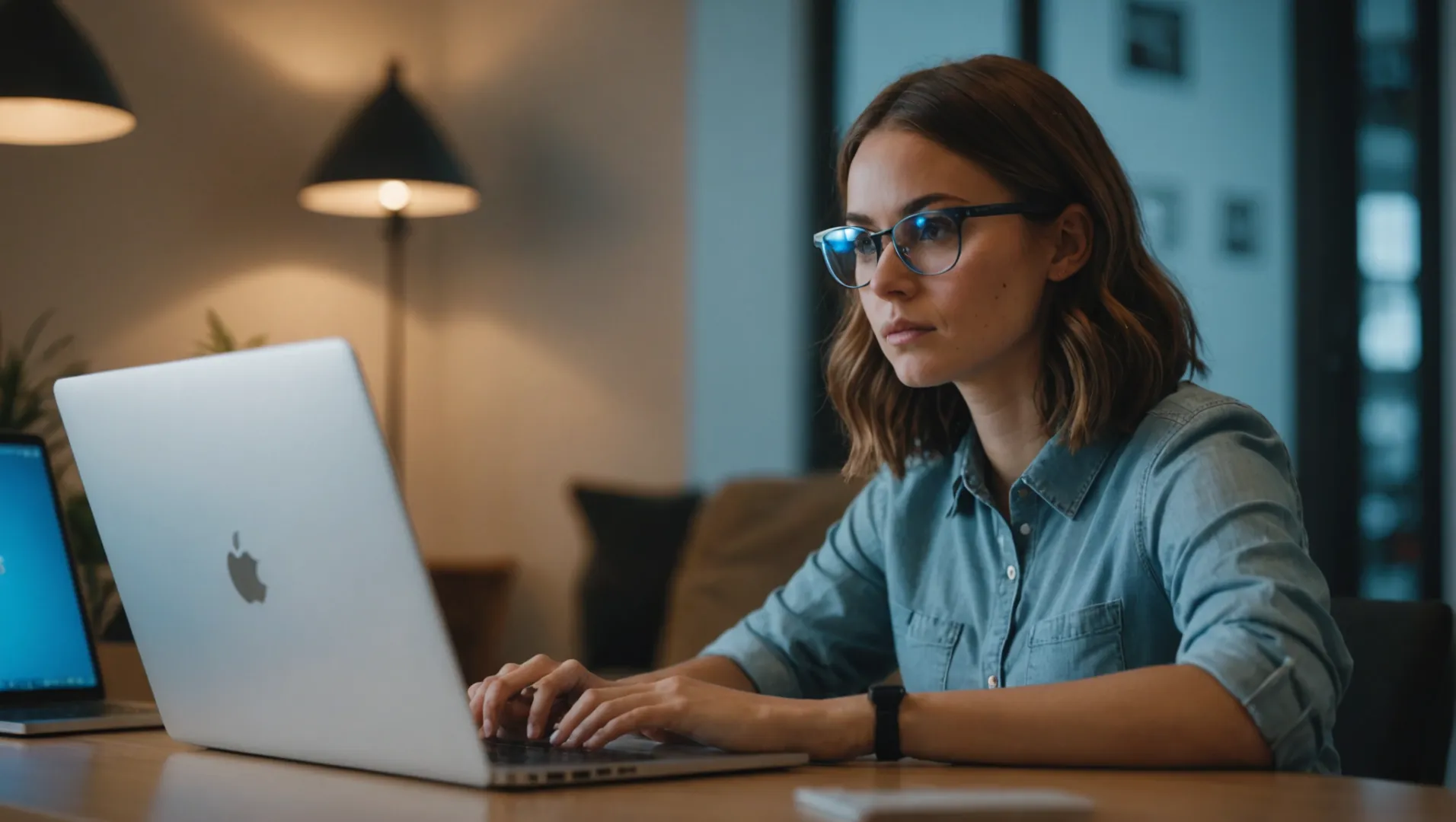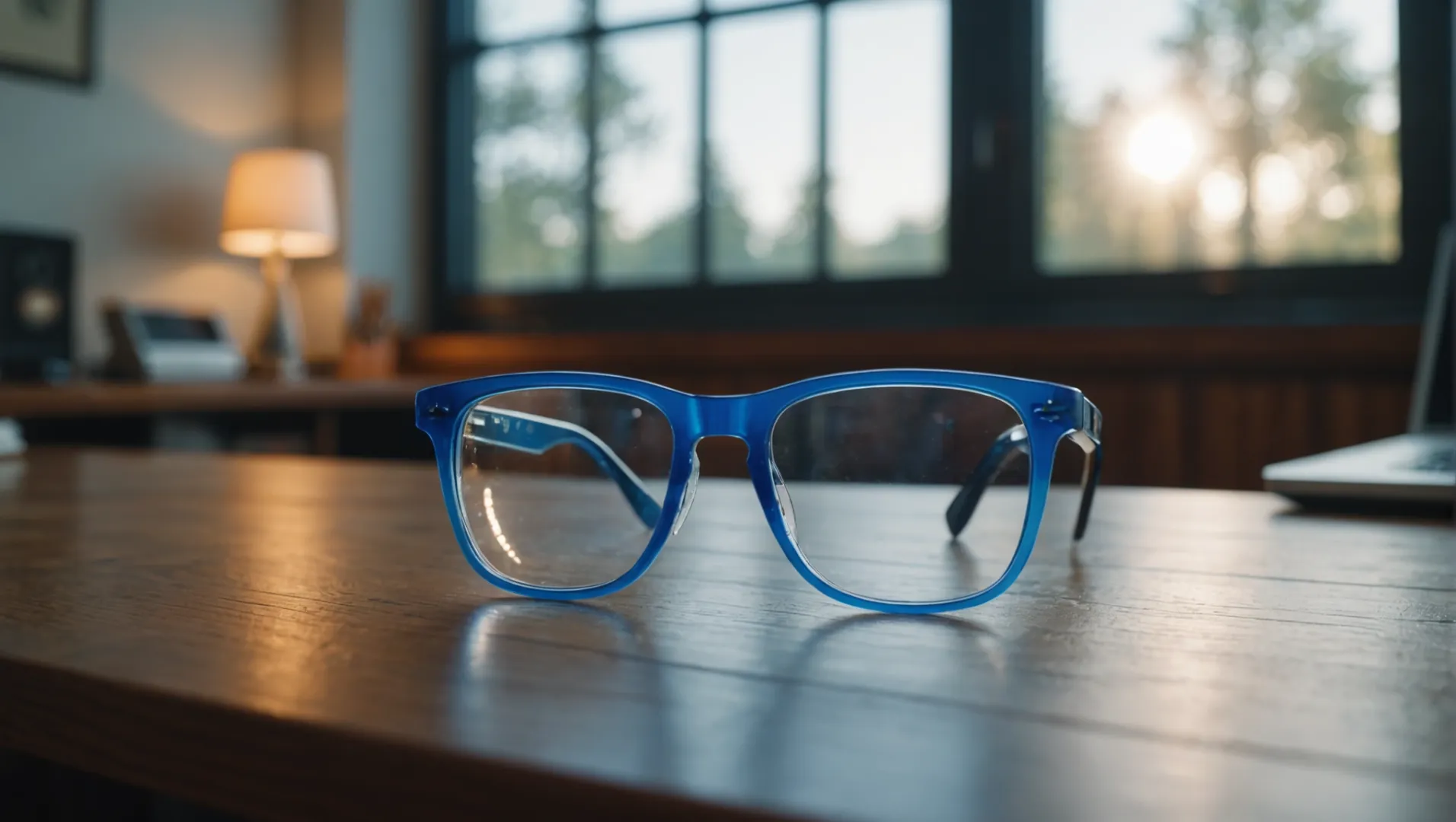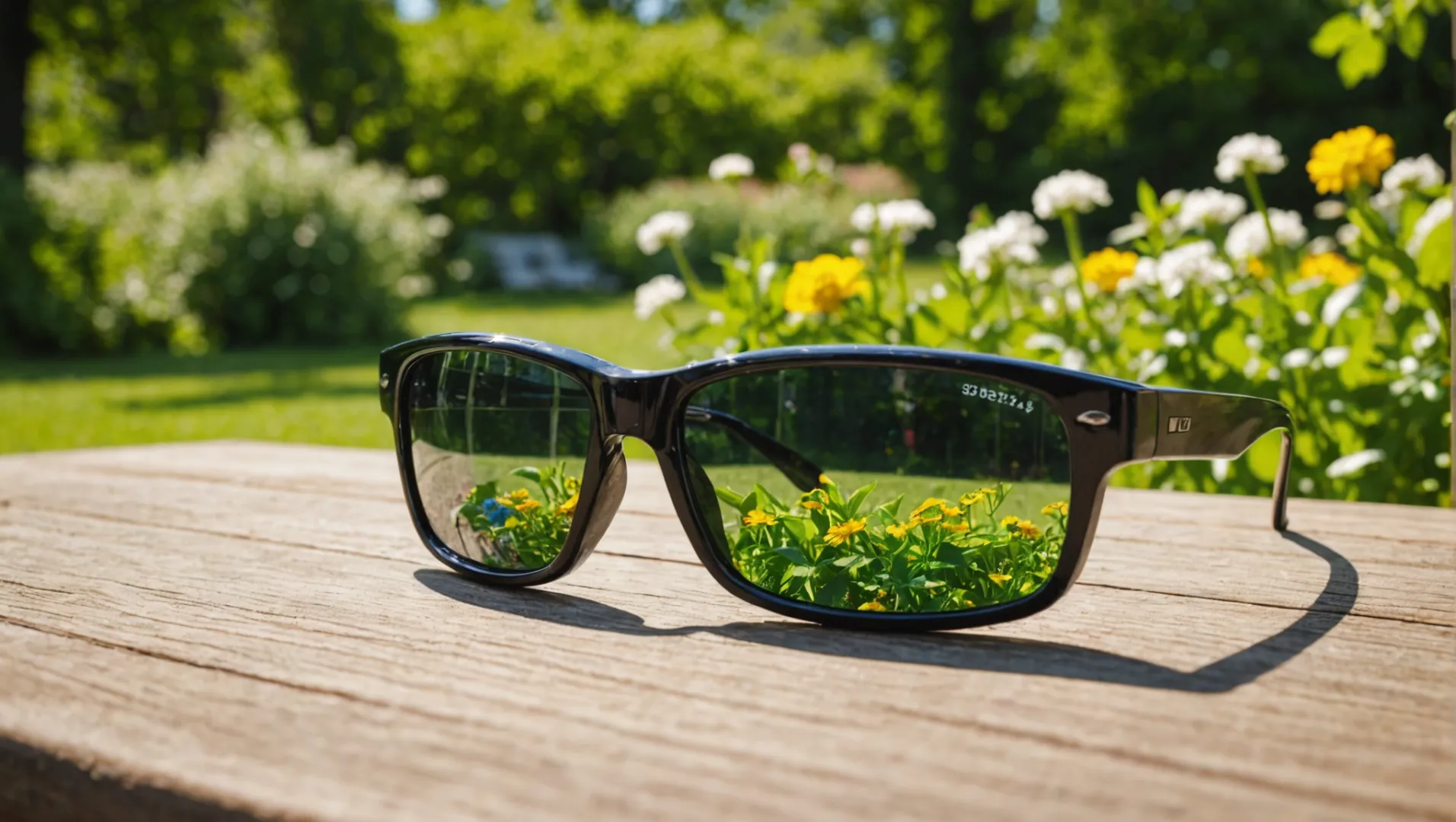
With the rise in screen time, many people are turning to eye protection glasses. But do they really work?
Eye protection glasses can be effective, especially blue light blocking glasses, which help reduce eye strain by filtering out blue light emitted from screens. Their effectiveness varies based on quality and intended use, offering relief for some but not all eye-related issues.
While this initial answer gives a glimpse into their utility, let’s dive deeper into the different types of protective eyewear and discover their true impact on our eye health and daily lives.
Blue light blocking glasses improve sleep quality.True
They help maintain natural circadian rhythms by reducing evening blue light exposure.
What Are Blue Light Blocking Glasses and How Do They Work?
In our digital age, blue light blocking glasses have become a staple for screen users seeking to protect their eyes.
Blue light blocking glasses are designed to reduce exposure to blue light from screens, mitigating eye strain and discomfort. They work by filtering or reflecting a portion of the blue light, helping alleviate symptoms like dry eyes and fatigue, though their effectiveness depends on the quality of the lenses.

Understanding Blue Light
Blue light is a part of the visible light spectrum with wavelengths between 380 to 500 nanometers. It is naturally emitted by the sun but is also produced by digital screens, LED lights, and fluorescent bulbs.
How Blue Light Blocking Glasses Work
These glasses employ special lenses that absorb or reflect a percentage of blue light, typically ranging from 30% to 60%.
| Feature | Description |
|---|---|
| Filtering | Lenses use coatings or materials that selectively block blue light. |
| Reflective Coatings | These reduce glare and reflect blue light away from the eyes. |
Benefits of Blue Light Blocking Glasses
For individuals spending extensive time on screens, such as office workers and gamers, these glasses can:
- Reduce Eye Strain: By minimizing blue light exposure, symptoms like dry eyes and headaches can be lessened.
- Enhance Sleep Quality: Exposure to blue light in the evening can disrupt sleep patterns. These glasses help maintain natural circadian rhythms.
Limitations and Considerations
Despite their advantages, blue light blocking glasses come with certain limitations:
- Color Distortion: Blocking too much blue light can lead to altered color perception, which may be problematic for design professionals.
- Limited Scope: They do not address other causes of eye strain, such as improper lighting or poor posture.
For those interested in exploring further, understanding the science behind blue light1 and its impact on eye health is crucial.
Choosing the Right Pair
When selecting blue light blocking glasses, consider factors like:
- Lens Quality: High-quality lenses ensure effective filtering without significant color distortion.
- Fit and Comfort: Comfortable frames encourage regular use.
Understanding how blue light interacts with our eyes and the extent to which blocking it can aid visual comfort requires further research2.
Blue light blocking glasses reduce eye strain by 60%.False
The effectiveness varies and typically ranges from 30% to 60%.
Blue light is only emitted by digital screens.False
Blue light is also naturally emitted by the sun and artificial lights.
Can UV Protection Glasses Prevent Long-term Eye Damage?
Are UV protection glasses a simple solution to prevent eye damage, or is there more to consider?
UV protection glasses can significantly reduce the risk of long-term eye damage by blocking harmful UVA and UVB rays. They help protect against conditions like cataracts and pterygium, especially for individuals frequently exposed to sunlight. However, their effectiveness depends on the quality of the lenses and adherence to UV-blocking standards.

Understanding UV Rays and Their Impact
Ultraviolet (UV) radiation from the sun can cause severe eye damage over time. Prolonged exposure increases the risk of developing eye diseases such as cataracts, which cloud the eye’s natural lens, and pterygium, a growth on the eye’s surface. UV rays are classified into UVA (320 – 400nm) and UVB (280 – 320nm), both of which can penetrate the eye and harm delicate tissues.
How UV Protection Glasses Work
UV protection glasses are designed to block these harmful rays effectively. High-quality lenses can obstruct over 99% of UV radiation, providing a shield that reduces the penetration of UV light into the eyes. This protection is crucial for individuals like construction workers or traffic police who spend extended periods outdoors, often under intense sunlight.
| Lens Quality | UV Blocking Efficiency |
|---|---|
| Premium | Over 99% |
| Mid-range | 90-99% |
| Low-quality | Less than 90% |
Real-world Applications
For those working in environments with high UV reflection, such as snowy or aquatic areas where UV intensity can increase by up to 80-90%, these glasses are vital. They minimize the cumulative effects of UV exposure, which can otherwise accelerate the onset of eye conditions.
However, not all UV protection glasses are created equal. Poor-quality glasses may fail to meet necessary standards, leaving wearers vulnerable to UV damage. Therefore, ensuring that your eyewear is certified for high UV protection is essential.
Limitations of UV Protection Glasses
While UV protection glasses are beneficial, they have limitations. They do not address other potential eye problems such as digital eye strain or issues stemming from poor nutrition or infections. For comprehensive eye health, wearing UV glasses should be part of a broader strategy that includes regular eye check-ups and protective measures against other stressors.
In conclusion, while UV protection glasses are an effective tool in safeguarding against specific types of eye damage, they work best when combined with other protective strategies and lifestyle adjustments. Explore more about selecting quality eyewear3.
UV protection glasses block over 99% of UV rays.True
High-quality lenses are designed to obstruct over 99% of UV radiation.
All UV protection glasses meet high UV-blocking standards.False
Not all glasses meet necessary standards; quality varies significantly.
Are Anti-Fatigue Glasses Worth It for Office Workers?
In today’s digital age, office workers spend significant hours staring at screens, often leading to eye strain. Could anti-fatigue glasses be the solution?
Anti-fatigue glasses help alleviate eye strain for office workers by incorporating features like progressive lenses and anti-reflective coatings. They offer benefits for those frequently switching between different focal lengths, making them a valuable tool for reducing visual fatigue.

Understanding Anti-Fatigue Glasses
Anti-fatigue glasses are specifically designed to tackle the visual strain associated with prolonged screen use and tasks requiring near vision. These glasses often feature progressive lenses, providing smooth transitions between different focal lengths without the visible lines found in traditional bifocals.
Key Features:
| Feature | Description |
|---|---|
| Progressive Lenses | Offer a gradient of lens powers for seamless focus transitions |
| Anti-Reflective Coating | Reduces glare from screens and overhead lighting |
| Blue Light Filtering | Some models also include blue light filtering capabilities |
Benefits for Office Workers
-
Reduced Eye Strain:
Office workers frequently engage in tasks requiring shifts in focus from computer screens to printed documents. Anti-fatigue glasses provide the necessary lens adjustments, minimizing muscle strain and improving comfort. -
Enhanced Productivity:
By reducing visual discomfort, these glasses can help maintain productivity levels throughout the day. This is especially beneficial during long work sessions without adequate breaks. -
Improved Visual Clarity:
Features like anti-reflective coatings enhance clarity by minimizing glare from artificial lighting, which is commonplace in office environments.
Considerations Before Purchasing
-
Quality and Fit:
As with any eyewear, ensuring the glasses are of high quality and fit comfortably is crucial. Poorly fitting glasses can negate their benefits and contribute to discomfort. -
Lifestyle Factors:
While these glasses offer significant benefits, they work best when complemented by healthy eye habits such as the 20-20-20 rule: every 20 minutes, look at something 20 feet away for 20 seconds.
Do Anti-Fatigue Glasses Replace Eye Care?
While anti-fatigue glasses are effective for reducing eye strain, they are not a substitute for regular eye check-ups or necessary treatments for structural eye conditions. They work best as part of a holistic approach to eye health that includes proper ergonomics and regular breaks from screens.
By evaluating how anti-fatigue glasses4 align with individual needs and work habits, office workers can make informed decisions about their potential benefits.
Anti-fatigue glasses reduce eye strain from screen use.True
These glasses are designed to minimize visual strain by providing lens adjustments.
Anti-fatigue glasses eliminate the need for regular eye check-ups.False
They complement eye care but do not replace regular check-ups or treatments.
Do Radiation Protection Glasses Provide Any Real Benefits?
Are radiation protection glasses a worthwhile investment, or do they offer more psychological comfort than physical protection?
Radiation protection glasses are designed to reduce exposure to electromagnetic radiation, though their effectiveness is debated. While beneficial in specific environments like radiology departments, everyday exposure from devices poses minimal risk, making these glasses largely unnecessary for most.

Understanding Radiation Protection Glasses
Radiation protection glasses are intended to shield the eyes from electromagnetic radiation (EMR) emitted by electronic devices and certain environments. These glasses typically incorporate materials or coatings that claim to reduce EMR exposure. However, the scientific consensus suggests that the levels of radiation from everyday electronics are generally too low to cause harm.
When Might They Be Useful?
In specific work environments, particularly in medical settings such as radiology departments, radiation protection glasses may offer some benefit. These settings might expose workers to higher levels of radiation compared to typical environments.
| Environment | Potential Exposure | Glasses Effectiveness |
|---|---|---|
| Hospital Radiology | High | Beneficial |
| Home/Office | Low | Minimal Benefit |
For those working regularly in high-radiation zones, wearing these glasses could serve as an additional safety measure.
Limitations and Considerations
The effectiveness of radiation protection glasses is limited by several factors:
-
Daily Device Use: The radiation emitted by devices such as phones and computers is minimal. For the general public, these glasses do not significantly reduce any health risks.
-
Perception vs. Reality: Often, the benefit of such glasses is more psychological, providing peace of mind rather than tangible physical protection.
-
Quality Variance: As with other types of protective eyewear, the effectiveness greatly depends on the quality of the glasses. Poorly made glasses might not meet claimed standards, offering little to no real protection.
The Bigger Picture
While it’s natural to seek ways to protect one’s health in an increasingly tech-driven world, it’s essential to consider realistic risks. Radiation protection glasses can be a useful tool in certain occupational scenarios but are generally unnecessary for everyday use around standard electronic devices.
For broader eye health concerns, focusing on proper screen habits and regular eye check-ups might be more effective strategies. To learn more about safe screen usage habits5, consider exploring expert recommendations on balancing technology use with eye health.
Radiation protection glasses are essential for everyday electronics use.False
Everyday electronic devices emit minimal radiation, posing little risk.
Radiation glasses offer psychological comfort more than physical protection.True
The perception of safety often outweighs the actual protective benefits.
Conclusion
In summary, eye protection glasses can significantly reduce strain and shield against UV rays. However, they are not a magic solution. Healthy eye habits and regular check-ups are vital for optimal eye health.
-
Explore how blue light impacts your eyes daily.: Blue light triggers your eyes to react, especially the lens, retina, and cornea. Some research shows a link between eye damage and short-wave blue light. ↩
-
Learn how to select effective blue light glasses.: Our blue light blocking glasses can help protect your eyes from harmful blue light and could reduce symptoms such as dry eyes, headaches and affected sleep … ↩
-
Find tips on selecting effective UV-blocking eyewear.: Sunglasses should have the largest lenses possible to protect your eyes from sun damage. Consider oversized or wraparound-style sunglasses to limit UV rays. ↩
-
Discover how anti-fatigue glasses improve comfort and productivity at work.: Anti-fatigue lenses are specially designed to reduce strain on the eyes caused by the prolonged use of computers and other digital devices. ↩
-
Find expert tips on maintaining eye health while using screens.: Examples of quality screen use are: connecting with friends and family (video chatting with grandparents) being creative (music, photography, design projects) ↩



